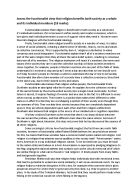In a capitalist economy, like our own, Marx would argue that the relationship between the bourgeoisie and the proletariat is one that is inherently conflictual, as well as mutually dependent (Livesy, 2006). This dependency arises from the capitalists requiring people to work for them in order to create profits and workers needing capitalists in order to earn money to provide them with the basic essentials for their survival. Conflict therefore arises as it is in the interests of capitalists to exploit the workforce to ensure higher profit margins. From a Marxist perspective, systems of stratification derive from the relationships between these two social groups in respect to the means of production (Haralambos & Holborn, 1995). Therefore, in a capitalist society this relationship can lead to inequality, poverty and an unequal distribution of power, income, wealth, and rewards such as salary. However, some groups are much more likely to end up in poverty than others (Haralambos & Holborn, 1995). For example, the working class, and in particular those within that class who are unskilled, are more likely to become unemployed due to changes in the economy; particularly within the manufacturing industry where there has been a reduction in the number of unskilled jobs available (Haralambos and Holborn, 1995). These groups are also at risk of becoming long term unemployed which can lead to poor living standards (Haralambos & Holborn, 1995). Also, living standards of the long term unemployed have been undermined by changes in government policy, when in 1982 the unemployed lost the right to earnings related supplements which was superseded by unemployment benefit, which in itself was restricted to the first twelve months after becoming unemployed. This benefit was far from generous as it was calculated, for a married couple in 1989, at 54% of the state pension for an equivalent couple (Haralambos & Holborn, 1995), which effectively amounted to £84 per week (Weir, 1994). Moreover, although state pensions were increased in line with inflation it took approximately one year for this to cease when Margaret Thatcher took office. Those who had been in receipt of unemployment benefit no longer shared in the prosperity of the employed which benefited not only the powerful groups in society such as political institutions and the state itself, but also widened the gap between classes (Haralambos & Holborn, 1995).
Undoubtedly some welfare benefits do benefit those on the lowest incomes for example income support, unemployment benefit and family credit are all directed at the poorest members of society. However, they do little to eradicate relative poverty (Giddens, 2006). Even so, functionalists view stratification as a positive system, whereby class inequality is beneficial, positive and necessary (Chapman, 2001). Davis and Moore (1967) argue that stratification makes a contribution to social order and that all societies have to ensure that important unique jobs are filled by those people with who are both talented and efficient. Moreover, inequality “motivates” and those with high paid jobs or in positions of power wish to retain their advantages and those who are at the bottom of the strata seek to improve their economic position for a better standard of living (Chapman 2001). Notwithstanding this, Marxists would argue that poverty benefits only the ruling class, or powerful groups, and that it exists because it serves the interests of those who own the means of production (Haralambos & Holborn 1995). Contrastingly, Gans (1968) argues that poverty is useful to a number of groups in society, namely the non-poor and in particular the rich and powerful (Haralambos & Holborn 1995). Poverty provides employment for fast growing sections of society, whereby jobs are created for those professions who deal with the poor such as the police, probation officers, social workers, and administration staff who oversee the poverty industry (Haralambos & Holborn 1995). In 1976 Britain’s health and social care sector employed almost 80,000 staff to deal with the poor (Haralambos & Holborn 1995).
In conclusion functionalists would argue that social stratification benefits everyone, even the poorest members of society, as this group would strive to get out of poverty and if this was to be achieved they would then be motivated further to maintain this status. Nevertheless, Marxists believe that social stratification benefits only the powerful groups in society. The widening gap between the rich and the poor within Britain provides support to the Marxist argument. Income inequality rose in 2001/2 to reach its highest ever level and in 2004/5 almost two thirds of the population had incomes below the national average equivalised income of £427 per week, suggesting that only a small number of people (the powerful group), are on relatively high incomes (Brewer et al 2006). It would seem that from these statistics, and the analysis provided in this paper, that indeed social stratification does benefit the powerful groups in society.
References
Brewer, M., Goodman, A., Shaw, J & Sibieta, L. (2006) Poverty and Inequality in Britain. The Institute for Fiscal Studies. Retrieved December 11, 2006, from http://www.ifs.org.uk/comms/comm101.pdf
Chapman, S. (2001) Sociology, Revise A2. London: Letts Educational.
Davis, K & Moore, W. E. (1967) Some principals of stratification. In Chapman, S. (2001) Sociology, Revise A2. London: Letts Educational.
Gans, H. J. (1968) ‘Culture and class in the study of poverty: An approach to anti-poverty research.’ In Haralambos, M. and Holborn, M. (1995) Sociology, Themes and Perspectives. Hammersmith: Collins Educational.
Giddens, A. (2006) Sociology. Cambridge: Polity Press.
Haralambos, M. and Holborn, M. (1995) Sociology, Themes and Perspectives. Collins Educational.
Livesy, C. (2006) Theoretical Perspectives, Social inequality. www.sociology.org
Editors of Wikipedia Encyclopedia Online. (2001- 2006). Social Stratification. Wikipedia Encyclopedia Online. Retrieved December 11, 2006, from http:/en.wikipedia.org/wiki/Social_stratification
Critically assess the view that social stratification benefits the powerful groups in society
Steven McMaster
B.I.F.H.E.








